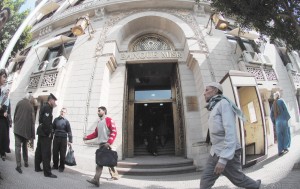
(DNE Photo)
By Nasser Youssef
A number of banks have stated that they consider themselves Egypt’s most affected economic sector by the country’s repeated credit downgrades since the outbreak of the 25 January Revolution, seeing as they are the primary owners of government debt securities.
Egyptian banks have already faced a number of difficulties in obtaining additional letters of credit and funding from foreign banks as a result of such downgrades, with many European, Arab and African banks requesting that all letters of credit held by Egyptian banks be verified by third parties.
Amr Hassanein, president of the Middle East Rating and Investors Service (MERIS), stated that Standard & Poor’s (S&P) will also soon downgrade the credit rating of individual banks operating on the Egyptian market, just days after downgrading the country’s credit rating itself.
Such downgrades, he said, will increase the cost of transactions between Egyptian and foreign banks.
Hassanein said that MERIS had recently downgraded the short- and long-term credit rating of the National Bank of Egypt (NBE), Banque Misr, and Commercial International Bank (CIB), adding that the future of these banks “does not look good”. Such downgrades, whether on the country or individual bank level, would eventually cause food prices to increase, he added.
The MERIS president went on to say that although S&P’s recent downgrade of Egypt’s long-term sovereign credit rating from B- to CCC+ would make it increasingly difficult for the country’s government to obtain international funding, this would not have an effect on the government’s negotiations with the International Monetary Fund (IMF) regarding the country’s pending $4.8bn loan. Such negotiations began long ago, he stated, with the IMF throughout the process being well aware of the potential for repeated downgrades of Egypt’s credit rating.
He also pointed to the need for reconciliation to take place between the country’s various political factions, saying that the country’s current crisis has made it difficult for investors to operate easily within the country. Such reconciliation, he claimed, would go far in helping the government implement its much needed economic reform programme.
Hassanein highlighted the importance of speeding up negotiations with the IMF to expedite Egypt’s securing of the $4.8bn loan.




